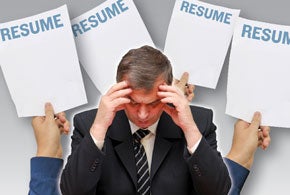
CIOs Grow Frustrated With Hiring Delays
 CIOs Grow Frustrated With Hiring Delays
CIOs Grow Frustrated With Hiring Delays
It’s taking more than a month to hire IT professionals these days—too long for many CIOs, as the delays result in many candidates taking a job with competitors.
 Slow Process
Slow Process
41% of the CIOs surveyed said the hiring process for IT staff jobs takes longer than they’d like.
 Extended Vacancy, Part I
Extended Vacancy, Part I
On average, CIOs said it takes 4.5 weeks to fill these jobs.
 Extended Vacancy, Part II
Extended Vacancy, Part II
27% said it takes up to three months to fill IT staff jobs.
 Biggest Barriers to Hiring Tech Talent
Biggest Barriers to Hiring Tech Talent
Candidates seek higher salaries than can be offered: 44%.
There’s a lack of qualified candidates: 33%.
Company is not viewed as employer of choice: 21%.
 Pet Peeve
Pet Peeve
57% of the professionals surveyed said a long post-interview wait to hear whether they got an offer is the most frustrating aspect of job searches.
 Tight Deadline
Tight Deadline
69% of workers said they’d wait up to two weeks after an interview to get a status update before losing interest in the job, and 23% said they’d wait only one week.
 Best Practice: Be Prepared
Best Practice: Be Prepared
Work with your team to determine the skills and experience most needed. Conduct research to find out what qualified candidates are seeking in salaries, benefits and incentives.
 Best Practice: Open the Process
Best Practice: Open the Process
Involve those team members in the interviews because their input can help make better decisions. With candidates, be totally transparent about the hiring process and job requirements.
 Best Practice: Move Quickly
Best Practice: Move Quickly
Don’t allow too much time to pass between interviews, status updates, internal discussions and, of course, the job offer.